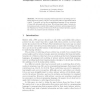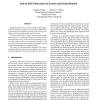174 search results - page 8 / 35 » Enforcing Non-safety Security Policies with Program Monitors |
USS
2008
13 years 11 months ago
2008
In this paper, we present an approach for verifying that trusted programs correctly enforce system security goals when deployed. A trusted program is trusted to only perform safe ...
SP
2008
IEEE
13 years 8 months ago
2008
IEEE
This paper provides a way to specify expressive declassification policies, in particular, when, what, and where policies that include conditions under which downgrading is allowed...
PET
2004
Springer
14 years 2 months ago
2004
Springer
Abstract. We develop a language-based approach for modeling and verifying aspects of privacy policies. Our approach relies on information-flow control. Concretely, we use the prog...
CSFW
2008
IEEE
13 years 10 months ago
2008
IEEE
Declassification occurs when the confidentiality of information is weakened; erasure occurs when the confidentiality of information is strengthened, perhaps to the point of comple...
PLDI
2009
ACM
14 years 3 months ago
2009
ACM
Decentralized information flow control (DIFC) is a promising model for writing programs with powerful, end-to-end security guarantees. Current DIFC systems that run on commodity ...


